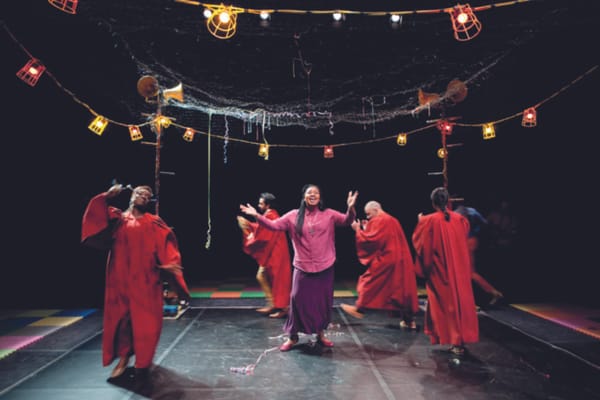Twelfth Night | A contrast between subtlety and aplomb
Twelfth Night is on at the National Theatre until 13th May

Going into the National Theatre’s production of Shakespeare’s Twelfth Night, I was expecting a slightly less-conventional production. I was not wrong. Director Simon Godwin is certainly not afraid to show us that this is a modern play from the off, with a flashy display of a shiny car cruising onto the stage piled with Orsino (Oliver Chris) and his dapper entourage. One lady I spoke to noted that the production was ‘unorthodox’, which is saying something, considering just how outrageous the original play is in terms of the themes it addresses: much of Twelfth Night’s charm can be attributed to its storyline, centring around classic cases of mistaken identity and complicated, mutating love polygons, of which Shakespeare is undoubtedly a master of.
The name of the play itself refers to the last night of Christmas, on which ridicule is supposed to ensue – husbands swapping roles with wives and so forth. It is perhaps appropriate therefore, that the most striking addition to this production is Malvolio’s replacement by Tamsin Greig’s Malvolia, cementing this production’s status as a very modern take on a play that itself was well ahead of its time – not only due to the more modern costumes and scenery, but also in the extent to which it thrusts the play’s ideas about gender roles into the limelight. The recasting of Malvolio as Malvolia – a woman played by a woman – has a fitting parallel in the times of Shakespeare, in which men would have played the female roles. This is perhaps an attempt by Godwin to show how society has evolved: gender identity is becoming more and more distinct from sex, with traditional male and female societal expectations being questioned and challenged.
Despite (and probably partly because of) her solemn and reserved appearance, which brings to mind Mary Barebone in the recent film Fantastic Beasts and Where to Find Them, Tamsin Greig is able to put forward a performance which is hilarious in the subtlety of its humour. The cold, disapproving stares and dramatic, inappropriate pauses, which are her forte, are in stark contrast to her puritan exterior: the very stuff from which ironic comedy is made. Certain moments of the play, however – such as the frankly outrageous costume in which she greets Olivia, or the sudden and exceedingly dramatic change of character, suggestive of her repressed love – are probably unnecessarily over the top, given Greig’s talent for being funny without the need for such an obvious display of ridicule. Perhaps it was the twirling tassels on her costume that tipped the scales from hilarity to downright disbelief.
But Shakespeare’s ‘comedies’ are not – in the sense of the word – simply light-hearted and humorous, as a comedy of today might be; despite the hilarious nature of this play there is of course the more sombre side that accompanies Malvolia’s later fate. Grieg’s portrayal of the tragedy of a woman whose love has been made into a joke was raw in its emotion, and heart-breaking to watch. Again, this felt odd in contrast with the incredulity of her earlier flashy show. Ideas about the roles of gender run strong throughout the performance: Feste is also played by a woman – Doon Mackichan – whose character is playful, light-hearted, and very entertaining, certainly lightening the mood; Tamara Lawrance’s Viola is very boyish and believable, quite adorably capturing the humour of the dramatic ironies of her situation. Her antics with Olivia (Phoebe Fox) whilst cross-dressing as Cesario, are amusing, and there are fitting touches of modern humour added here and there, such as a racy scene in a Jacuzzi involving a set of golden swimming trunks. This would not be possible without a fully-fledged water feature that the stage is graced with, one which also masquerades as an ostensible, full-size fountain. The presence of all this water seems to simply beg for somebody to get drenched. Suffice to say we are not disappointed on those grounds.
This audacious scenery is testament to the brilliant show put on – quite literally – by the technical and lighting team. They make full use of the Olivier Theatre’s majestic drum revolve, whose centrepiece is a grand triangular staircase: at one moment stationary, and at the next swivelling to create a sense of simultaneity between several different settings. Within seconds, the set manages to change from a ship crashing into rocks in a storm, to the more docile setting of Olivia’s house, complete with modern looking glass panels and men in suits bright enough to throw light on the future of fashion.
Not to be outmatched by Orsino and his crew, a very hipster Sir Toby Belch, played by Tim McMullan, is one of the highlights of this performance. His authentic performance as the constantly drunk uncle was so good that it made me feel as though the bottles he was incessantly swigging from were perhaps slightly more than simple props. Along with the wing-man with a man-bun Sir Andrew Aguecheek – Daniel Rigby – the two are the comedy relief duo of the comedy itself, entertaining us with their various antics to pleasant tunes sung by Feste and a small but skilled team of live musicians – including a saxophone player and guitarist - adding a lot of aural colour to the atmosphere.
For the most part, the modern take on this play does question ideas about societal roles well. However, attempts to put emphasis on these ideas can sometimes go a bit too far, notably in a rather flamboyant scene involving a drag queen at a saucy bar called The Elephant which seemed to be in the production for the sole purpose of making absolutely certain we understood the main theme. Simply shouting things louder can sometimes produce an effect opposite to that intended – something not exclusive to the domain of theatre – and I would say that the cleverest moments of this production were when humour and ideas were put forward less explicitly. On the other hand, Twelfth Night is a comedy whose very name suggests it is meant to be over the top and outrageous; Godwin, his cast, and the production team certainly managed to put on a great performance, leaving myself and most of the audience in stitches.









